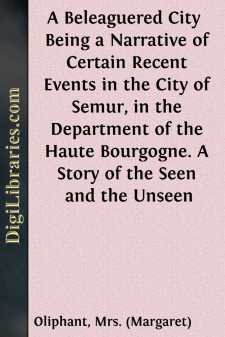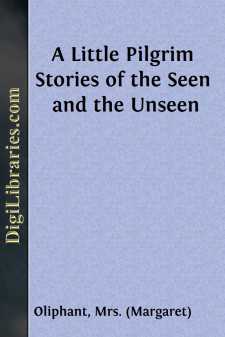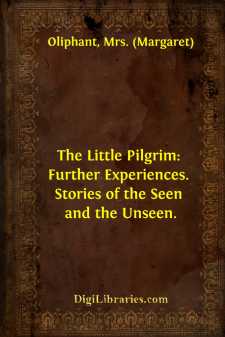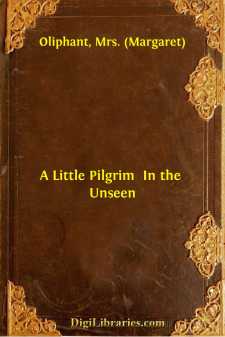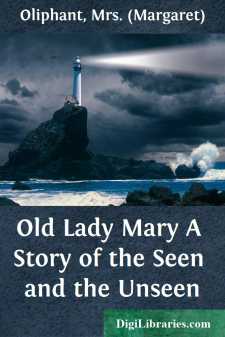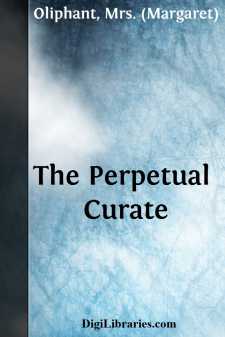Categories
- Antiques & Collectibles 13
- Architecture 36
- Art 48
- Bibles 22
- Biography & Autobiography 813
- Body, Mind & Spirit 142
- Business & Economics 28
- Children's Books 17
- Children's Fiction 14
- Computers 4
- Cooking 94
- Crafts & Hobbies 4
- Drama 346
- Education 46
- Family & Relationships 57
- Fiction 11829
- Games 19
- Gardening 17
- Health & Fitness 34
- History 1377
- House & Home 1
- Humor 147
- Juvenile Fiction 1873
- Juvenile Nonfiction 202
- Language Arts & Disciplines 88
- Law 16
- Literary Collections 686
- Literary Criticism 179
- Mathematics 13
- Medical 41
- Music 40
- Nature 179
- Non-Classifiable 1768
- Performing Arts 7
- Periodicals 1453
- Philosophy 64
- Photography 2
- Poetry 896
- Political Science 203
- Psychology 42
- Reference 154
- Religion 513
- Science 126
- Self-Help 84
- Social Science 81
- Sports & Recreation 34
- Study Aids 3
- Technology & Engineering 59
- Transportation 23
- Travel 463
- True Crime 29
Mrs. (Margaret) Oliphant
Mrs. Margaret Oliphant (1828–1897) was a prolific Scottish novelist and historical writer, known for her insightful portrayals of domestic life and society. She authored over 100 works, including novels, biographies, and histories, with notable series like the Chronicles of Carlingford. Despite facing personal hardships, including the loss of her husband and several children, Oliphant's writing career flourished, leaving a lasting impact on Victorian literature.
Author's Books:
Sort by:
THE NARRATIVE OF M. LE MAIRE: THE CONDITION OF THE CITY. I, Martin Dupin (de la Clairière), had the honour of holding the office of Maire in the town of Semur, in the Haute Bourgogne, at the time when the following events occurred. It will be perceived, therefore, that no one could have more complete knowledge of the facts—at once from my official position, and from the place of eminence in the...
more...
I. IN THE UNSEEN. She had been talking of dying only the evening before, with a friend, and had described her own sensations after a long illness when she had been at the point of death. "I suppose," she said, "that I was as nearly gone as any one ever was to come back again. There was no pain in it, only a sense of sinking down, downвÐâthrough the bed as if nothing could hold me...
more...
I. THE LITTLE PILGRIM IN THE SEEN AND UNSEEN. The little Pilgrim, whose story has been told in another place, and who had arrived but lately on the other side, among those who know trouble and sorrow no more, was one whose heart was always full of pity for the suffering. And after the first rapture of her arrival, and of the blessed work which had been given to her to do, and all the wonderful things...
more...
She had been talking of dying only the evening before, with a friend, and had described her own sensations after a long illness when she had been at the point of death. "I suppose," she said, "that I was as nearly gone as any one ever was to come back again. There was no pain in it, only a sense of sinking down, down—through the bed as if nothing could hold me or give me support...
more...
John Tatham, barrister-at-law, received one summer morning as he sat at breakfast the following letter. It was written in what was once known distinctively as a lady's hand, in pointed characters, very fine and delicate, and was to this effect:— "Dear John, Have you heard from Elinor of her new prospects and intentions? I suppose she must have written to you on the subject. Do you know...
more...
I She was very old, and therefore it was very hard for her to make up her mind to die. I am aware that this is not at all the general view, but that it is believed, as old age must be near death, that it prepares the soul for that inevitable event. It is not so, however, in many cases. In youth we are still so near the unseen out of which we came, that death is rather pathetic than...
more...
I THE OPEN DOOR. I took the house of Brentwood on my return from India in 18вÐâ, for the temporary accommodation of my family, until I could find a permanent home for them. It had many advantages which made it peculiarly appropriate. It was within reach of Edinburgh; and my boy Roland, whose education had been considerably neglected, could go in and out to school; which was thought to be...
more...
MARGARET OF SCOTLAND, ATHELING—QUEEN AND SAINT It is strange yet scarcely difficult to the imagination to realise the first embodiment of what is now Edinburgh in the far distance of the early ages. Neither Pict nor Scot has left any record of what was going on so far south in the days when the king's daughters, primitive princesses with their rude surroundings, were placed for safety in the...
more...
CHAPTER I. THE PASTOR'S PROGRESS. Miss Phœbe Tozer, the only daughter of the chief deacon and leading member of the Dissenting connection in Carlingford, married, shortly after his appointment to the charge of Salem Chapel, in that town, the Reverend Mr. Beecham, one of the most rising young men in the denomination. The marriage was in many ways satisfactory to the young lady's family, for...
more...
Carlingford is, as is well known, essentially a quiet place. There is no trade in the town, properly so called. To be sure, there are two or three small counting-houses at the other end of George Street, in that ambitious pile called Gresham Chambers; but the owners of these places of business live, as a general rule, in villas, either detached or semi-detached, in the North-end, the new quarter,...
more...


